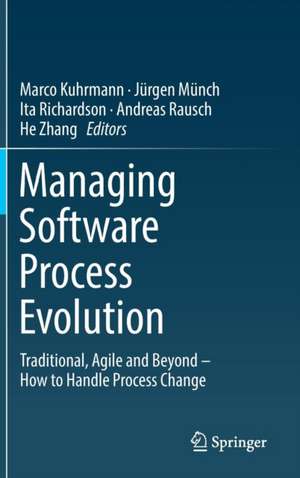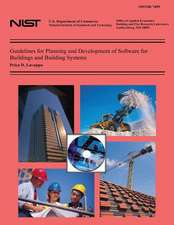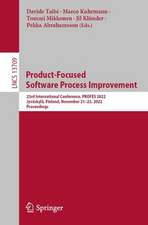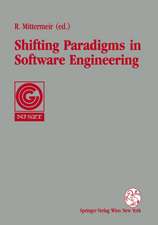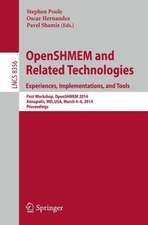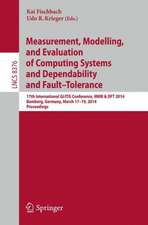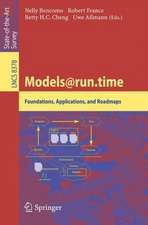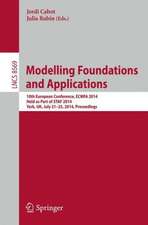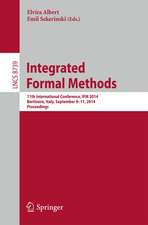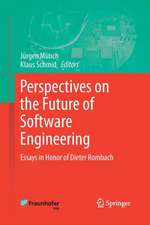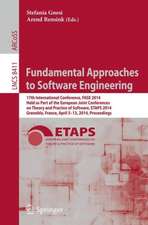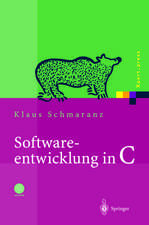Managing Software Process Evolution: Traditional, Agile and Beyond – How to Handle Process Change
Editat de Marco Kuhrmann, Jürgen Münch, Ita Richardson, Andreas Rausch, He Zhangen Limba Engleză Hardback – 22 sep 2016
Reflecting these topics, the book is divided into three parts. Part 1 focuses on software business transformation and addresses the questions of which process(es) to use and adapt, and how to organizeprocess improvement programs. Subsequently, Part 2 mainly addresses process modeling. Lastly, Part 3 collects concrete approaches, experiences, and recommendations that can help to improve software processes, with a particular focus on specific lifecycle phases.
This book is aimed at anyone interested in understanding and optimizing software development tasks at their organization. While the experiences and ideas presented will be useful for both those readers who are unfamiliar with software process improvement and want to get an overview of the different aspects of the topic, and for those who are experts with many years of experience, it particularly targets the needs of researchers and Ph.D. students in the area of software and systems engineering or information systems who study advanced topics concerning the organization and management of (software development) projects and process improvements projects.
| Toate formatele și edițiile | Preț | Express |
|---|---|---|
| Paperback (1) | 648.76 lei 6-8 săpt. | |
| Springer International Publishing – 14 iun 2018 | 648.76 lei 6-8 săpt. | |
| Hardback (1) | 655.02 lei 6-8 săpt. | |
| Springer International Publishing – 22 sep 2016 | 655.02 lei 6-8 săpt. |
Preț: 655.02 lei
Preț vechi: 818.78 lei
-20% Nou
Puncte Express: 983
Preț estimativ în valută:
125.34€ • 131.13$ • 104.12£
125.34€ • 131.13$ • 104.12£
Carte tipărită la comandă
Livrare economică 02-16 aprilie
Preluare comenzi: 021 569.72.76
Specificații
ISBN-13: 9783319315430
ISBN-10: 3319315439
Pagini: 316
Ilustrații: XXVII, 332 p. 73 illus., 7 illus. in color.
Dimensiuni: 155 x 235 x 21 mm
Greutate: 0.68 kg
Ediția:1st ed. 2016
Editura: Springer International Publishing
Colecția Springer
Locul publicării:Cham, Switzerland
ISBN-10: 3319315439
Pagini: 316
Ilustrații: XXVII, 332 p. 73 illus., 7 illus. in color.
Dimensiuni: 155 x 235 x 21 mm
Greutate: 0.68 kg
Ediția:1st ed. 2016
Editura: Springer International Publishing
Colecția Springer
Locul publicării:Cham, Switzerland
Cuprins
1. Low Ceremony Processes for Short Lifecycle Projects.- 2. The Right Degree of Agility in Rich Processes.- 3. Assessing Product Development Agility.- 4. Value-driven Process Management.- 5. Are we Ready for Disruptive Improvement?.- 6. Trials and Tribulations of the Global Software Engineering Process.- 7. The Route to Software Process Improvement in Small and Medium-sized Enterprises.- 8. Managing Software Process Evolution for Spacecraft from a Customer’s Perspective.- 9. Modeling Software Processes Using BPMN: When and When Not?.- 10. Software Processes Management by Method Engineering with MESP.- 11. Adapting Case Management Techniques to Achieve Software
Process Flexibility.- 12. A Researcher’s Experiences in Supporting Industrial Software Process Improvement.- 13. Lessons Learned from Co-Evolution of Software Process and Model-Driven Engineering.- 14 Monitoring and Controlling Release Readiness by Learning across Projects.- 15. The Effects of Software Process Evolution to Technical Debt—Perceptions from Three Large Software Projects.
Recenzii
“This book focuses on the evolution of software processes and presents different aspects of it, including design, development, management, governance, and application. … I enjoyed reading this book. It is well structured and well balanced around applicability to industry, industrial experience, and academic rigor. … A practitioner will enjoy the range of presented topics. … I truly enjoyed reading the book.” (Alexandre Bergel, Computing Reviews, April, 2017)
Notă biografică
About the Editors:
Marco Kuhrmann is Associate Professor at the University of Southern Denmark, Odense, where he heads the software engineering section. He holds a Ph.D. and a habilitation in computer sciences from the Technische Universität München, Germany. His research is focused on software process & quality management and agile engineering.
Jürgen Münch is a Professor of Software Engineering at the University of Reutlingen, Germany, and a Research Director in the Department of Computer Science at the University of Helsinki, Finland. His research in software engineering is focused on product management, lean analytics, rapid value delivery, innovation processes, and agile engineering. He regularly supports companies to improve their product strategy and product development. He has been awarded the IFIP TC2 Manfred Paul Award for Excellence in Software Theory and Practice, and the Distinguished Professor Award FiDiPro of Tekes.
Ita Richardson is an Associate Professor at the University of Limerick in Ireland and a Principal Investigator in Lero – the Irish Software Engineering Research Centre. She holds a Ph.D. in computer sciences from the University of Limerick. Her research is focused on software process improvement, global software development, software quality in healthcare and connected health.
Andreas Rausch is Professor for Software Systems Engineering at the Technical University of Clausthal. He holds a Ph.D. in computer science from the Technische Universität München. His research is focused on software architecture, modeling, and software processes for the development of reliable and long-living software systems.
He (Jason) Zhang is Professor at the Software Institute of Nanjing University, China. He was awarded a Ph.D. in computer science from the University of New South Wales (UNSW) in Australia. He joined academia after seven years in industry, where he had developed software systems in the areas of aerospace and complex data management. He does research in software engineering, in particular software processes (modelling, simulation, analytics and improvement), empirical and evidence-based software engineering, service-oriented computing, and software engineering research methodologies.
Marco Kuhrmann is Associate Professor at the University of Southern Denmark, Odense, where he heads the software engineering section. He holds a Ph.D. and a habilitation in computer sciences from the Technische Universität München, Germany. His research is focused on software process & quality management and agile engineering.
Jürgen Münch is a Professor of Software Engineering at the University of Reutlingen, Germany, and a Research Director in the Department of Computer Science at the University of Helsinki, Finland. His research in software engineering is focused on product management, lean analytics, rapid value delivery, innovation processes, and agile engineering. He regularly supports companies to improve their product strategy and product development. He has been awarded the IFIP TC2 Manfred Paul Award for Excellence in Software Theory and Practice, and the Distinguished Professor Award FiDiPro of Tekes.
Ita Richardson is an Associate Professor at the University of Limerick in Ireland and a Principal Investigator in Lero – the Irish Software Engineering Research Centre. She holds a Ph.D. in computer sciences from the University of Limerick. Her research is focused on software process improvement, global software development, software quality in healthcare and connected health.
Andreas Rausch is Professor for Software Systems Engineering at the Technical University of Clausthal. He holds a Ph.D. in computer science from the Technische Universität München. His research is focused on software architecture, modeling, and software processes for the development of reliable and long-living software systems.
He (Jason) Zhang is Professor at the Software Institute of Nanjing University, China. He was awarded a Ph.D. in computer science from the University of New South Wales (UNSW) in Australia. He joined academia after seven years in industry, where he had developed software systems in the areas of aerospace and complex data management. He does research in software engineering, in particular software processes (modelling, simulation, analytics and improvement), empirical and evidence-based software engineering, service-oriented computing, and software engineering research methodologies.
Textul de pe ultima copertă
This book focuses on the design, development, management, governance and application of evolving software processes that are aligned with changing business objectives, such as expansion to new domains or shifting to global production. In the context of an evolving business world, it examines the complete software process lifecycle, from the initial definition of a product to its systematic improvement. In doing so, it addresses difficult problems, such as how to implement processes in highly regulated domains or where to find a suitable notation system for documenting processes, and provides essential insights and tips to help readers manage process evolutions. And last not least, it provides a wealth of examples and cases on how to deal with software evolution in practice.
Reflecting these topics, the book is divided into three parts. Part 1 focuses on software business transformation and addresses the questions of which process(es) to use and adapt, and how to organize process improvement programs. Subsequently, Part 2 mainly addresses process modeling. Lastly, Part 3 collects concrete approaches, experiences, and recommendations that can help to improve software processes, with a particular focus on specific lifecycle phases.
This book is aimed at anyone interested in understanding and optimizing software development tasks at their organization. While the experiences and ideas presented will be useful for both those readers who are unfamiliar with software process improvement and want to get an overview of the different aspects of the topic, and for those who are experts with many years of experience, it particularly targets the needs of researchers and Ph.D. students in the area of software and systems engineering or information systems who study advanced topics concerning the organization and management of (software development) projects and process improvements projects.
Reflecting these topics, the book is divided into three parts. Part 1 focuses on software business transformation and addresses the questions of which process(es) to use and adapt, and how to organize process improvement programs. Subsequently, Part 2 mainly addresses process modeling. Lastly, Part 3 collects concrete approaches, experiences, and recommendations that can help to improve software processes, with a particular focus on specific lifecycle phases.
This book is aimed at anyone interested in understanding and optimizing software development tasks at their organization. While the experiences and ideas presented will be useful for both those readers who are unfamiliar with software process improvement and want to get an overview of the different aspects of the topic, and for those who are experts with many years of experience, it particularly targets the needs of researchers and Ph.D. students in the area of software and systems engineering or information systems who study advanced topics concerning the organization and management of (software development) projects and process improvements projects.
Caracteristici
Collects and summarizes the state of the art in analysis, design, implementation, management and governance, improvement and enactment of software processes Provides the foundations of current research on software process improvement and management and lays the basis for further problem-driven research Addresses researchers and practitioners by providing recent research results as well as experiences and best practices Includes supplementary material: sn.pub/extras
